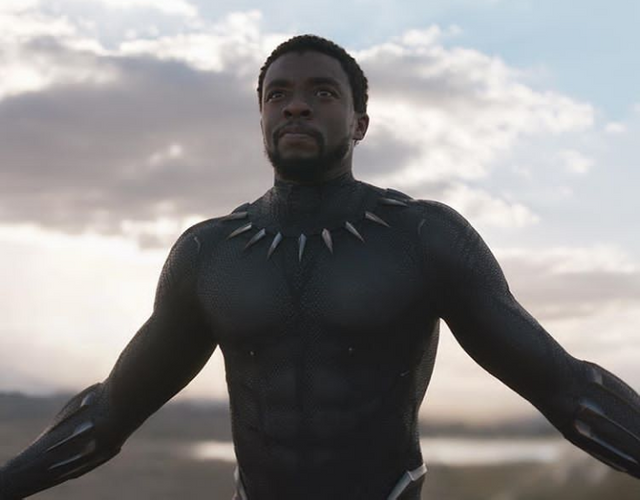“Black Panther,” one of the most highly anticipated movies of 2018, has already broken pre-sale ticket records for its parent company Marvel Cinematic Universe. But the journey from comic book to screen has taken more than 50 years: Black Panther, Marvel Comic’s first black superhero, debuted in Marvel’s “Fantastic 4” comic in 1966, and became a member of the Avengers two years later, but didn’t get his own comic until 1977.The series centers on T’Challa, king of Wakanda, and the wealthiest fictional character in the Marvel universe. Unlike many other heroes, T’Challa inherits his mantle from his father T’Chaka (the previous king), and gains his powers—including superacute senses and enhanced strength and speed—from a combination of skill, divine favor and a special herb. In a 1990 interview with The Comics Journal, co-creator Jack Kirby described why he created the character: “I came up with the Black Panther because I realized I had no blacks in my strip…I had a lot of black readers. My first friend was…black! And here I was ignoring them because I was associating with everybody else.”Black Panther’s story originates in the fictional nation of Wakanda, touted in the comic as the only African country that was never colonized—though many tried. Over the years, observers have drawn real-world parallels between Wakanda and Ethiopia, which was never officially colonized, but was occupied by Italy in the 1930s. Without outside powers extracting its resources, or imposing exploitative policies, Wakanda flourishes and becomes the most technologically advanced country on earth, rich in natural resources such as the fictional element Vibranium. (Sound familiar? It’s what Captain America’s shield is made of.)
To understand more about “Black Panther” and the history it reflects, we got some help from author Adilifu Nama, author of Super Black: American Pop Culture and Black Superheroes.
HISTORY: Why is ‘Black Panther’ so important?
Adilifu Nama: What makes the Black Panther such a significant figure in American popular culture—as well as black popular culture—is its groundbreaking representation of blackness as more than a stereotypical and racist trope of inferiority. We have to keep in mind the historical context of the superhero’s first emergence—in 1966, against the backdrop of the Civil Rights and burgeoning black-power movement. That becomes important because in many ways [the emergence of a black superhero]…marks a racial transformation happening on a political and social levelWhat is the significance of the nation of Wakanda?
Wakanda symbolizes a wonderland of possibilities: What would have happened to a society not [affected] by the devastating impact of racism and colonialism? In that sense, the film is a beacon for the black imagination…what blackness could be in the future.
Why do you think this film resonated so widely before it was even released?
I would argue that “Black Panther” as a film project is probably more attuned to being a black science-fiction film than a comic-book adaptation. The groundswell of buzz and anticipation, particularly across black communities in the U.S. and world, is not a function of millions of comic-book readers that have followed the Black Panther in the various iterations you have in Marvel Comics. This film speaks to a broader pent-up demand and desire to see a science-fiction version of blackness that is on par with a “Star Wars… We’ve never seen this kind of visionary…African/black representation of super science, and technological advancement and social standing outside the historical [context] of colonialism.How do you think this character, who is such a product of the 1960s zeitgeist, resonates today?
[It is] such a strong allegory [of] our contemporary moment, given the way in which racial tensions—in American society in particular—have come to the forefront. Particularly in the wake of the Black Lives Matter movement and the comments by the president disparaging African nations, black football players standing up by kneeling… Against that type of backdrop, films such as “Get Out” and “Black Panther” have a vivid resonance.
Do you think the film will retain the political aspects of the comic?
The comic is more symbolic and allegorical… The film has more…racial politics right in your face.
nice post, I like it... please Follow me. I am New User
Downvoting a post can decrease pending rewards and make it less visible. Common reasons:
Submit
Hi! I am a robot. I just upvoted you! I found similar content that readers might be interested in:
http://www.history.com/news/the-real-history-behind-the-black-panther
Downvoting a post can decrease pending rewards and make it less visible. Common reasons:
Submit
Nice
Downvoting a post can decrease pending rewards and make it less visible. Common reasons:
Submit
nice post
Downvoting a post can decrease pending rewards and make it less visible. Common reasons:
Submit
Great one
Downvoting a post can decrease pending rewards and make it less visible. Common reasons:
Submit
Congratulations @neekolazz! You received a personal award!
Click here to view your Board
Vote for @Steemitboard as a witness and get one more award and increased upvotes!
Downvoting a post can decrease pending rewards and make it less visible. Common reasons:
Submit
Congratulations @neekolazz! You received a personal award!
You can view your badges on your Steem Board and compare to others on the Steem Ranking
Do not miss the last post from @steemitboard:
Vote for @Steemitboard as a witness to get one more award and increased upvotes!
Downvoting a post can decrease pending rewards and make it less visible. Common reasons:
Submit